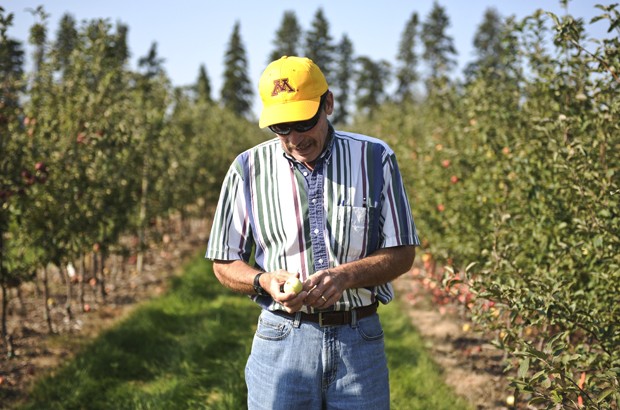The University of Minnesota apple breeding program has developed what it believes is the next great apple. The SweeTango apple made its commercial debut on Monday and should cause quite a stir within the apple market. For more than 100 years the apple breeding program at the University has been at the forefront of apple research. The University is home to one of only three apple breeding programs in the country. The primary focus of the program is the cross breeding of different apple varieties in hopes of developing a new, better apple. Apple breeding, a long and tedious process, begins by combining the genes of two different apple species in hopes of acquiring the beneficial properties of both in the same plant. Once the two varieties are crossed, the apples are tested on 20 characteristics until a near perfect apple is found. The patent on the UniversityâÄôs latest famed apple variety, the Honeycrisp, expired in November. Apple expert Dave Bedford, head of apple breeding at the Minnesota Landscape ArboretumâÄôs AppleHouse , personally tastes five to six hundred apples a day in search of the next hit variety. âÄúItâÄôs like the lottery,âÄù Bedford said. In the SweeTango, it appears the University has indeed found the heir to the Honeycrisp throne. The SweeTango is the result of a crossbreed of two of the UniversityâÄôs most popular apples. Apple breeders at the University have captured the renowned texture of the Honeycrisp and the full, sweet flavor of the Zestar , producing what it believes will be its most popular apple to date. With the loss of the Honeycrisp patent, nearly half of the funding for the apple breeding program was gone. University marketers, using lessons learned during the Honeycrisp patenting process, have decided to more strictly control the release of the SweeTango. On top of collecting royalties on sales of the SweeTango, the exclusive sales rights to the SweeTango have been sold to Pepin Heights Orchard , who in turn is limiting the number of trees allowed to any given orchard. This level of control has angered several local orchards like Afton Apple Orchard . Cindy Femling, spokesperson for Afton Apple Orchard labeled the SweeTango a âÄúclub apple,âÄù calling the Pepin Heights deal âÄúsigned, sealed and delivered before anyone even knew about it.âÄù Femling said the University is doing a good job marketing the apple, but itâÄôs not helping Minnesota apple growers because Pepin Heights is only allowing 1,000 Minneiska trees per orchard and Femling said large orchards would typically have 4,000 to 5,000 of the Minneiska trees. Jim Rhodes , assistant business development specialist at the University, said the University allowed the Honeycrisp to be grown in less than ideal situations and theyâÄôre trying to keep the SweeTango exclusive and controlled in order to keep it as perfect as possible. âÄúWe looked at this particular apple differently than other apples,âÄù Rhodes said. He said the limited distribution of the trees will help smaller orchards compete with larger orchards. Dennis Courtier, owner of Pepin Heights Orchard, agrees with Rhodes about controlling the distribution of the apple. âÄúBetter control of the SweeTango will allow us to better control eating quality,âÄù Courtier said. Courtier said there will be hardly any SweeTango apples this fall because the trees were hit hard by hail storms in the spring. The level of control and subsequent controversy will make SweeTango a rarity this fall. âÄúWhen you hit a diamond, you know it,âÄù Bedford said. The best opportunities to find the SweeTango this fall will be at boutique supermarkets like KowalskiâÄôs, Lunds and ByerlyâÄôs , or at the University AppleHouse where apples are available for purchase in their development phase.

Image by Marija Majerle
Bedford slices up an apple to sample Wednesday. Bedford tastes five to six hundred apples a day in hopes of developing a new and better apple.
SweeTango apple hits the market
U’s new apple will have a limited distribution, leaving some orchards unhappy.
Published September 7, 2009
0
More to Discover







